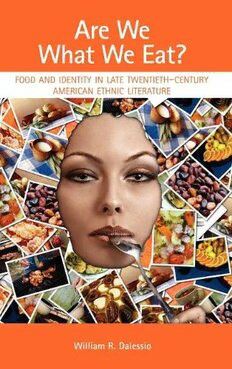
Are We What We Eat? Food and Identity in Late Twentieth-Century American Ethnic Literature PDF
Preview Are We What We Eat? Food and Identity in Late Twentieth-Century American Ethnic Literature
Are We What We Eat? Are We What We Eat? FOOD AND IDENTITY IN LATE TWENTIETH-CENTURY AMERICAN ETHNIC LITERATURE William R. Dalessio Copyright 2012 William R. Dalessio All rights reserved Printed in the United States of America No part of this publication may be reproduced, stored in or introduced into a retrieval system, or transmitted, in any form, or by any means (electronic, mechanical, photocopying, recording, or otherwise), without the prior permission of the publisher. Requests for permission should be directed to: [email protected], or mailed to: Cambria Press 20 Northpointe Parkway, Suite 188 Amherst, NY 14228 Library of Congress Cataloging-in-Publication Data Dalessio, William R. Are we what we eat? : food and identity in late twentieth-century American ethnic literature / by William R. Dalessio. p. cm. Includes bibliographical references and index. ISBN 978-1-60497-801-8 1. American literature—20th century—History and criticism. 2. Cultural pluralism in literature. 3. Food in literature. 4. American literature—Minority authors—History and criticism. 5. Immigrants in literature. 6. Group identity in literature. I. Title. PS228.P55D35 2012 810.9’353—dc23 2012003350 For my family—especially my mother, Josephine DeAngelis Dalessio, and my father’s mother, Maria Acciardo Dalessio, whose cooking has nourished my body, mind, and soul T C ABLE OF ONTENTS Acknowledgments ix Introduction 1 Chapter 1: Eating Away at the Past and the Present: Assimilation and Alienation in Our House in the Last World and Typical American 17 Chapter 2: Honoring the Past in the Present: Food Preparation and Cultural Preservation in Paper Fish and Black Dog of Fate 53 Chapter 3: Hungering for Home: The Search for Identity in How the García Girls Lost Their Accents and Catfi sh and Mandala 89 Chapter 4: The Joy of Cooking and Eating: Cultural Hybridity and Female Empowerment in Oreo and Mona in the Promised Land 123 Conclusion 163 Notes 169 Bibliography 185 Index 201 A CKNOWLEDGMENTS My sincere thanks and gratitude are due Dr. Veronica Makowsky and Dr. Lynn Z. Bloom for their guidance and advice on this project and other professional endeavors. I also thank the editors of Studies in the Humanities for granting me p ermission to reprint portions of my second chapter—the sections on Black Dog of Fate, which originally appeared in their journal. And I thank Cambridge Scholars Publishing for granting me permission to reprint an earlier version of my fourth chapter, originally a chapter in a book edited by Annette M. Magid.
